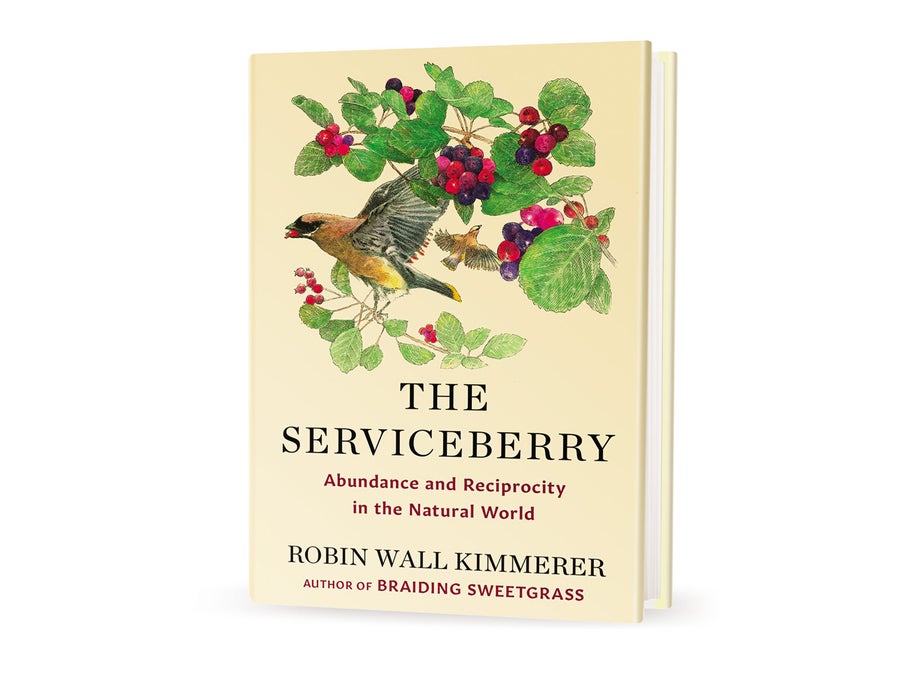October 15, 2024
4 min learn
E book Evaluate: How the Creator of Braiding Sweetgrass Imagines a New Economic system
Robin Wall Kimmerer modified our concepts of sustainability. Can she do the identical for economics?
Elva Etienne/Getty Photos
NONFICTION
The Serviceberry: Abundance and Reciprocity within the Pure World
by Robin Wall Kimmerer.
Scribner, 2024 ($20)
Nature offers many presents, however it’s simple to take them with no consideration. It’s not simply the strawberries you purchase on the grocery retailer but additionally the plastic container that holds them, product of historical life-forms reworked into fossils after which feedstock for plastics. How can we higher acknowledge the worth of the pure world and construct communities—and economies—that acknowledge such abundance?
On supporting science journalism
In the event you’re having fun with this text, think about supporting our award-winning journalism by subscribing. By buying a subscription you might be serving to to make sure the way forward for impactful tales concerning the discoveries and concepts shaping our world at present.
That is the central query of The Serviceberry: Abundance and Reciprocity within the Pure World. It’s the third guide by Robin Wall Kimmerer, an ecologist, professor on the State College of New York Faculty of Environmental Science and Forestry, and member of the Citizen Potawatomi Nation. For seven sleepy years, her final guide, Braiding Sweetgrass: Indigenous Knowledge, Scientific Data, and the Teachings of Crops, revealed in 2013, quietly grew in reputation, till it leaped onto the New York Occasions bestseller record in 2020, the place it has remained. It was as if Kimmerer’s ideas about animating nature and respecting nonhuman species as in the event that they had been folks, advised via the non-public lens of an Indigenous scientist, struck a chord that was aching to be performed. These concepts proceed to reverberate: she is routinely invited to be a keynote speaker, her phrases are emblazoned on museum partitions, and in 2022 she obtained the distinguished MacArthur Basis “genius” grant.
The Serviceberry, which grew out of a 2022 essay in Emergence Journal, is a a lot slimmer quantity than Braiding Sweetgrass however is written with the identical lyrical, personable voice that invitations readers into worlds of risk. Briefly chapters punctuated by line drawings from illustrator John Burgoyne, this candy providing builds on her concepts concerning the reward economic system and the way Indigenous knowledge may inform it. She explores historical tips referred to as the Honorable Harvest, her interpretation a bulleted manifesto for gratitude and the way round economies are a approach to put these ideas into apply.
Kimmerer additionally continues her inquiry into language and what it reveals about worldviews. Within the opening chapter, we study Bozakmin is the Potawatomi phrase for “serviceberry,” a local shrub integral in Indigenous foodways that produces a blueberrylike fruit. Bozakmin is, actually, the “best of the berries,” and the Potawatomi root phrase for “berry” additionally means “gift.” Languages world wide supply examples that exhibit the deeper connections we as soon as needed to the earth that very actually sustains us. The Greek phrase oikos, Kimmerer writes, is the basis for each “ecology” and “economy.”
Oh, however how we’ve forgotten the hyperlink! As Kimmerer fills a pail with an abundance of serviceberries within the opening scene, a flock of cedar waxwings becoming a member of her within the harvest, she sees the fruit as “a pure gift from the land. I have not earned, paid for, nor labored for them.” She urges readers to pay attention to the small bequests that abound, which remind us we reside in a world of reciprocity the place giving will be liberated from a man-made market that manufactures shortage and particular person need: Little Free Libraries on entrance lawns and free packing containers of garments and the invitation from a neighbor to return decide berries free of charge.
Kimmerer admits this fashion of beneficiant residing—intimate with each the land and one’s neighbors—works finest in small, close-knit communities. But greater than half the world’s inhabitants now lives in city environments, and the move from nation to metropolis continues. Given this context, how will we, as she writes, “reclaim ourselves as neighbors”? If serviceberries had been a marketable commodity, I can’t assist however marvel, would her neighbors have opened their farm to her for a free day of harvesting? I wished her to wrestle extra with the capitalist juggernaut by which practically all of us are enmeshed, one dominated by the schemes of individuals untroubled by destroying what others love within the title of revenue.
“Recognizing ‘enoughness’ is a radical act,” she writes, “in an economy that is always urging us to consume more.” Recognition is one step. Remodeling economies is one thing else altogether. Kimmerer, who donated her guide advance to land conservation and social justice work, writes that she is aware of little of economics or finance. Though she seeks understanding via books and conversations, she appears to wrestle the best way many people do with how such concepts would scale.
The reply, Kimmerer writes within the final and strongest chapter, is to look to ecological succession within the pure world, the place disturbances trigger seemingly intransient methods to rework. Capitalism could not crumble, however we might pursue circumstances for financial succession to an area the place reciprocity is acknowledged. Not simply by imagining one other approach to be on the planet however by creating it. Many vegetation and animals go dormant, ready for the correct second to resurface and are available absolutely alive once more. Can concepts and methods of being, like rhizomes reaching via soil, do the identical?


